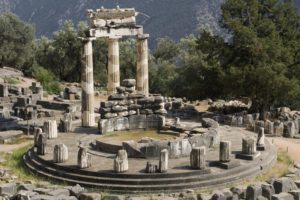[Greek] πρόγνωσις (prognōsis), [Latin] praescentia: foreknowledge, prophecy, prognostication, foretelling, perceiving beforehand, knowing beforehand; Act.2:23, 1Pet.1:2

The Oracle at Delphi: a place to seek guidance and knowledge for healing
Background Information:
Greek Hellenism: The classical sense of prognosis means knowing, perceiving, and learning beforehand. Subject matter included matters of war, politics and healing. Apollo was an oracular god, the prophetic deity of the Delphic Oracle. Medicine and healing were associated with Apollo. Greek physicians would often seek the help (advance knowledge) and guidance of Apollo in making a medical prognosis. Ordinarily the ancient physician, lacking pathological and diagnostic tools, would rely just upon the available physical evidence concerning the patient.
Old Testament: The idea of prognosis, for the most part, is not highly stressed in the Old Testament. This is generally found with the prophets, whom impart God’s knowledge and truth. Prognosis is exemplified in the prophets’ efforts to warn and reform the behavior of others. In the book of Wisdom, Wisdom hastens to make herself known to those who desire her (Wis.6:13). Wisdom knows the things of old and infers the things to come (Wis.8:8). The book of Wisdom foretells the destruction of the firstborn. When they determined to put to death the infants of the holy ones, that night was known beforehand to our ancestors (Wis.18:5-6). The book of Judith makes reference to the predetermined knowledge and prophetic foreknowledge of God. Judith says to God, ‘All your ways are in readiness, and your judgment is made with foreknowledge (Jud.9:6)
New Testament: In the New Testament, prognosis essentially means advance knowledge. This consists of having knowledge beforehand and the content of this foreknowledge. Jesus was known before the foundation of the world, but He is later revealed. God foreknew His people since He conforms them in His image. Often, God’s judgments and decrees were made in the eternity past with the aid of His foreknowledge. This prophecy of the Word can be used of His believers. The sense of knowing previously comes from a Hellenistic tradition in medicine.
Scripture:
“This man, delivered up by the set plan and foreknowledge of God, you killed, using lawless men to crucify Him.” Act.2:23
God, outside of time, knew and permitted this happen as part of His Providence. God allow His Son to be crucified in order to take upon the sins of the world.
“He was known before the foundation of the world but revealed in the final time for you, who through Him believe in God who raised Him from the dead and gave Him glory, so that your faith and hope are in God.” 1Pet. 1:20-21
God had known beforehand that He would bring His Son for our redemption.
First Apology by Justin Martyr (148-155 A.D)
“We are convinced of the truth of all that He taught us, because whatever He foretold would happen is actually happening. This is the work of God: He tells of a thing before it happens, afterwards showing that it happens as it was foretold.”
Justin Martyr, recently converted to Christianity, used his philosophical skills to evangelize his fellow pagan philosophers in the temple grounds. These pagan philosophers encouraged Justin Martyr to be able to present his arguments for Christianity. God is viewed as the One who simply knows beforehand.
Conclusion:
Prognosis, prognostication, prescient
Justin Martyr, as a philosopher, would have already been versed in the idea of the foreknowledge of God. I would say that modern doctors today would cringe at the methods the ancient Greek doctors used in making prognoses. Seeking the help of an oracle to make a prognosis is not a very sound scientific method. I suppose these ancient Greek doctors tried their best, despite their lack of diagnostic tools. The Hippocratic Oath is a moral code for ethical conduct and practice in medicine. Its principles are to treat the sick to the best of one’s abilities, to preserve patient privacy, and to teach the secrets of medicine to the next generation. Interestingly, the earliest known oath states, “I swear by Apollo, the Healer…”
I do not think one has to be given special insight to realize that God is all-knowing. This is the very definition of God! It also make sense for the prophets to be involved in this knowledge. Otherwise, they wouldn’t be prophets.
